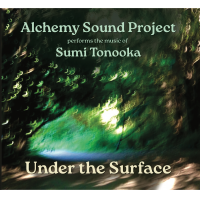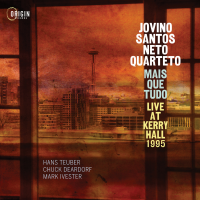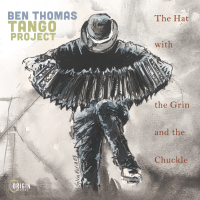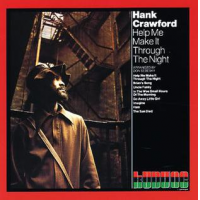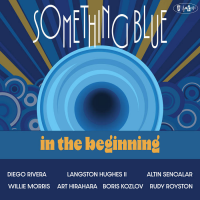Home » Jazz Articles » Liner Notes » Bill Evans: Duos With Jim Hall & Trios '64 & '65 Revisited
Bill Evans: Duos With Jim Hall & Trios '64 & '65 Revisited
Bill Evans
piano1929 - 1980

Jim Hall
guitar1930 - 2013

George Russell
composer / conductor1923 - 2009

Duke Ellington
piano1899 - 1974

Charles Mingus
bass, acoustic1922 - 1979

Max Roach
drums1925 - 2007
Evans was the first to meet Russell when, in late 1955, recently arrived in New York, he visited him with the singer Lucy Reed, a mutual friend. Russell's first impressions of Evans were not promising. "Plain looking guy, very quiet, very withdrawn," he said. "I thought, this is going to be like pulling teeth all day." After a sightseeing trip on the Staten Island ferry, the party returned to Russell's apartment, where Evans sat at the piano and began to play. "It was one of those magic moments in your life, when you expect a horror story and the doors of heaven open up," said Russell. In 1956, Evans was a featured soloist on the sessions for Russell's formidable declaration-of-intent, The Jazz Workshop (RCA Victor, 1957), one of whose tracks was titled "Concerto For Billy The Kid."
Hall enters the story in 1959. That summer, Evans and Russell taught at the Music Inn School of Jazz at Lenox, Massachusetts. So did Hall. During three weeks together, the musicians bonded. When Hall moved from Los Angeles to New York in 1960, Russell invited him to join the musical salon which gathered at his apartment. Evans was already a participant. All this suggests that the idea for the duo may have originated there.
Whatever their provenance, Evans and Hall's Undercurrent (United Artists, 1962), and Intermodulation (Verve, 1966), span the ugliest and most desperate years in Evans' life...
Rewind to 1960's Portrait In Jazz (Riverside), Evans' debut with

Scott LaFaro
bass1936 - 1961

Paul Motian
drums1931 - 2011
The sky descended on Evans on July 6, 1961, when LaFaro was killed in an automobile accident. Just ten days earlier, Evans, LaFaro and Motian had made their historic recordings at the Village Vanguard, achieving Evans' goal of simultaneous improvisation and challenging the traditional top-down model of the piano trio. Evans was devastated by LaFaro's death. Already living with a heroin habit, he doubled down on it. He hit bottom in spring 1963, when he and his partner Ellaine Schultz were evicted from their apartment for failing to pay the rent and their possessions were dumped in the street by their landlord. Evans was, however, already foundering in April 1962, when he and Hall began recording Undercurrent. Yet, despite all the negativity surrounding him, the album is at least as beatific, and as intimately conversational, as anything Evans recorded with LaFaro and Motian. The same is true of Intermodulation.
There is significant symmetry between Evans' "manifesto" and

Albert Ayler
saxophone, tenor1936 - 1970

Gary Peacock
bass, acoustic1935 - 2020

Sunny Murray
drums1937 - 2017
[It is notable that Undercurrent was recorded in late April and mid May 1962, on days adjacent to those on which Hall was recording

Sonny Rollins
saxophoneb.1930
Russell's proximity can be detected in the trio recordings here, too, made while Evans was searching for LaFaro's successor. Before joining Evans,

Chuck Israels
bass, acousticb.1936
Israels' lyrical approach made him a relatively seamless continuation of LaFaro's legacy. He was affronted by Evans' use of heroin, however, and his offstage relationship with Evans was fraught. After Israels left, Evans told his friend Gene Lees that he would never have a Leo, Israels' star sign, in the trio again; nor did he.
Peacock was a more empathetic colleague. Like Evans, he was bookish, and he shared an interest in Eastern esotericism. He also brought a new spin to the trio's music. But Peacock was restless, "in the middle of a personal crisis," as Evans put it in a 1965 interview. Within a few months he had headed off towards Ayler and Spiritual Unity. Nevertheless, with Trio '64 (Verve), their sole album together, Evans, Peacock and Motian left a treasure. Peacock switches fitfully between agitation and serenity, and Evans responds in kind. At its most exhilarating, Evans' work with Peacock recalls his headlong, tumbling solo on "Concerto For Billy The Kid," where we began.
Liner Notes copyright ? 2025 Chris May.
Duos With Jim Hall & Trios '64 & '65 Revisited can be purchased here.
Contact Chris May at All About Jazz.
Chris May is a senior editor of All About Jazz. He was previously the editor of the pioneering magazine Black Music & Jazz Review, and more recently editor of the style / culture / history magazine Jocks & Nerds.
Track Listing
CD1: My Funny Valentine; I Hear A Rhapsody; Dream Gypsy; Romain; Skating In Central Park; Darn That Dream; Little Lulu; A Sleeping Bee; Always; Santa Claus Is Coming To Town; I'll See You Again; For Heavens Sake; Dancing In The Dark; Everything Happens To Me. CD2: Israel; Elsa; Round Midnight; Our Love Is Here To Stay; How My Heart Sings; Who Can I Turn To?; Come Rain Or Come Shine; If You Could See Me Now; I've Got You Under My Skin; My Man's Gone Now; Turn Out The Stars; Angel Face; Jazz Samba; All Across The City.
Personnel
Bill Evans
pianoJim Hall
guitarGary Peacock
bass, acousticChuck Israels
bass, acousticPaul Motian
drumsLarry Bunker
drumsAlbum information
Title: Duos With Jim Hall & Trios '64 & '65 Revisited | Year Released: 2023 | Record Label: Ezz-thetics
Tags
Comments
PREVIOUS / NEXT
Support All About Jazz
 All About Jazz has been a pillar of jazz since 1995, championing it as an art form and, more importantly, supporting the musicians who make it. Our enduring commitment has made "AAJ" one of the most culturally important websites of its kind, read by hundreds of thousands of fans, musicians and industry figures every month.
All About Jazz has been a pillar of jazz since 1995, championing it as an art form and, more importantly, supporting the musicians who make it. Our enduring commitment has made "AAJ" one of the most culturally important websites of its kind, read by hundreds of thousands of fans, musicians and industry figures every month.







 Buy Now
Buy Now




